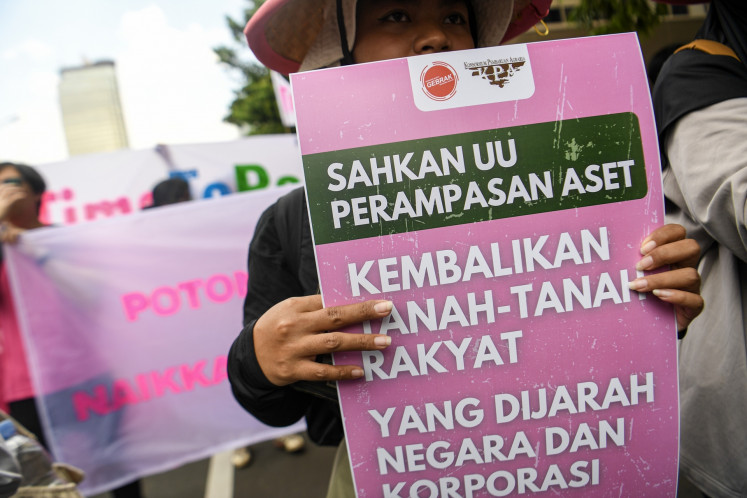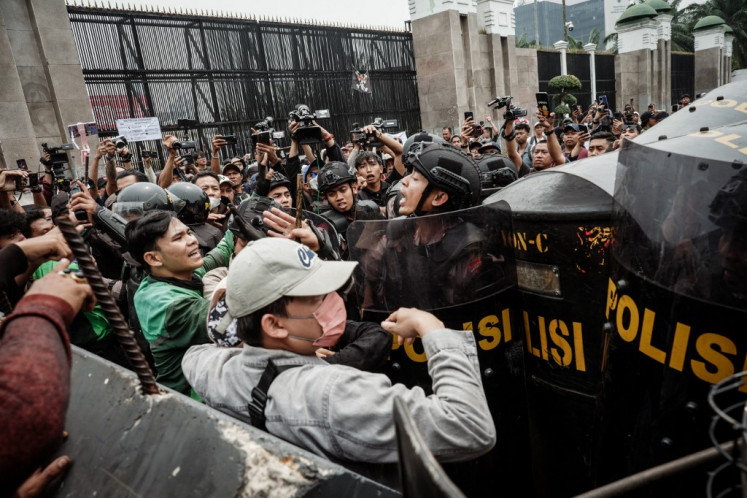Popular Reads
Top Results
Can't find what you're looking for?
View all search resultsPopular Reads
Top Results
Can't find what you're looking for?
View all search resultsDance draws on Javanese and Tai Chi traditions
Courtesy of Salihara A contemporary dance performance will be held at the Salihara Community next week, exploring the connections between Javanese traditional dance and Tai Chi movement
Change text size
Gift Premium Articles
to Anyone
Courtesy of Salihara
A contemporary dance performance will be held at the Salihara Community next week, exploring the connections between Javanese traditional dance and Tai Chi movement.
“This work is my exploration, trying to get at a deeper understanding of the body. I want to know more about the essence of human movement. My curiosity comes out of my knowledge of basic Javanese traditional dance and Tai Chi, which I’ve been learning since I moved to Taiwan,” dancer and choreographer Danang Pamungkas told The Jakarta Post upon his arrival form Taiwan on Wednesday.
“I want to know the similarities and differences between the gestures and movements of these two traditions.”
He said he found links between the smooth and meditative gestures of Javanese dance and the meditative patterns of Tai Chi.
“These movements are subtle but carry a powerful influence no less.”
Having named the composition Song of Body, Danang said it will express and explore a deeper understanding of the essential elements of body movement.
“It’s a kind of meditative movement beginning in the body’s core, allowing the dancer to be closer to nature,” Danang said. However, he said not to look for direct references, the choreography would not quote gestures from these traditions, even though he has used them as a jumping off point in this work, in pursuit of a selfsame feeling.
Danang and Rianto will performed the dance on Feb. 2-3, accompanied by Song and Poems for Solo Cello by the American minimalist composer Philip Glass and supported by lighting designer Sugeng Yeah.
Danang has reason to be curious about the powerful magic of the two cultural expressions since he has experienced both worlds throughout his career. Moreover, he has now join the Cloud Gate Dance Theater in Taiwan where he also learns Tai Chi. Born in Surakarta (Solo), Central Java, in 1979, he started studying dance at age 15.
He received formal training at Solo’s high school for traditional arts and graduated from the Indonesian Art Institute Surakarta (STSI) in 2005. He also learned traditional dance as it is practiced at the Keraton Mangkunegaran, Solo’s royal palace, where he took the role of principal dancer.
His works including Gulung (1999), Gliyong (2000), Trance (2002), Dograg and Gaung (2003), Di ujung Pintu (2005), On The Chair (2006), and One Circle (2007) have been performed on many occasions in the major cities of Java.
His Panyot Pun Padam was awarded first prize at The Next Wave Indonesian national choreography competition in 2004.
Since 2003, his dancing in works by several prominent choreographers have also fueled his transboundary exploratory fire. He danced in Sardono W. Kusumo’s Hutan Plastik (Plastic Forest) in Jakarta and Bangkok and his No Body Body’s in Jakarta and Surabaya, Selasar
Sunaryo’s Sunken Sea in Bandung and Eko Supriyanto’s Opera Ronggeng in Solo.
He also played in Ki Slamet Gundono’s grass-puppet plays and performed in Korean choreographer Sen Hea Ha’s Infinita at Uijeoungbu Music Festival and at Modafe Art Festival in Korea, at Singapore Art Mart in Singapore in 2005, as well as in Belgium and the Anmaro Art Festival in Amsterdam in 2006.
He has also produced some collaborative pieces such as Spring in Solo with the Japanese Pappa Tarahumara Dance Theater which was performed in Solo in 2002, Monteverdi’s Orfeo with the English National Opera which was performed at the London Coliseum and the Shubert Theater in Boston in 2006, as well as The Coronation of Poppea likewise staged at the Shubert and the Coliseum in 2007.
Song of Body
The dance will be presented at Teater Salihara on Feb. 2-3, 2009, at 8 p.m.. Tickets (Rp 30,000 or Rp 15,000 for students) can be bought at the Salihara Community, by phone (Asty 0817-999-5057, Laly 0812-8008-9008, Nike 0818-0730-4036) or by online reservation (www.salihara.org).










